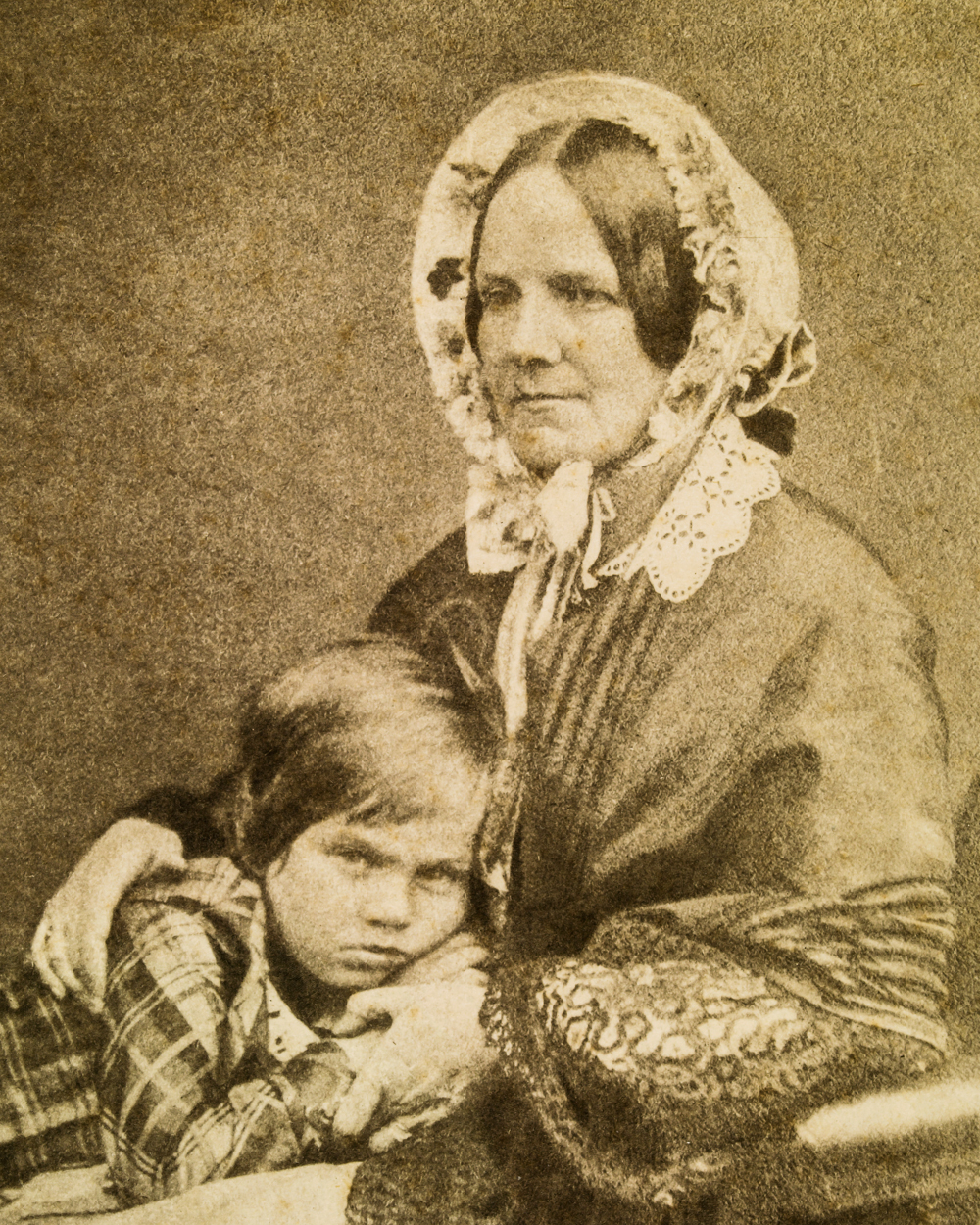Emma Darwin, Charles Darwin's wife and first cousin, was born Emma Wedgwood, the eighth and youngest child of Josiah Wedgwood II and Bessy Allen. Her father was the eldest son of the famous pottery manufacturer, Josiah Wedgwood I. Her mother was one of eleven children brought up in a remote country house in Wales. Emma was part of a large and lively extended family, Unitarian in religion, liberal in politics, and with links to the intellectual elite of the country. Her immediate family lived at Maer Hall in rural Staffordshire, a few miles from the Etruria pottery works. Her sister Fanny, two years older than her, to whom she was very close (they were known collectively as the Dovelies, or Miss Pepper and Salt) died in 1832.
Her father's eldest sister, Susannah, had married Robert Waring Darwin of Shrewsbury, and had six children, including Charles Darwin. The two families spent a good deal of time together, and Charles, whose mother died when he was eight, may have found Maer at times more cheerful than his own home. It was Emma's father he turned to for support when his own father forbade him to go on the Beagle voyage.
Emma and Charles married in January 1839 and moved into a rented house in Gower Street, London. Their first child, William Erasmus Darwin, was born in December the same year, and Anne Elizabeth Darwin was born in March 1841. In 1842, Charles bought Down House in the village of Down, Kent, where he and Emma were to spend the rest of their married lives. It was within easy reach of London, but rural and quiet: the house was on the edge of the village, surrounded by fields. Eight more children were born (Mary, Henrietta Emma, George Howard, Elizabeth, Francis, Leonard, Horace, and Charles Waring). Two of these died in infancy (Mary and Charles Waring), and Anne died at the age of 10. Charles and Emma also cared for their grandson Bernard, Francis's son: his mother, Amy, died a few days after his birth.
Emma took part in the social life of the village, running a lending library for the children, helping to organise provision of a reading room for working men, and sending doctors to the sick and infirm. She acted as Charles's amanuensis, read to him, and translated from French, German, and Italian. Although she was not able to summon up as much interest in the minutiae of his research as she had originally hoped, she kept an eye on his press. Devout (though not particularly doctrinaire) herself, she was anxious about the implications of his work for religion. Observing the effect of Charles's work on his nerves and his health, she insisted on frequent holidays: they usually went to London to stay with relatives two or three times a year, and Emma also managed to organise holidays on the Isle of Wight, in Wales, and in the Lake District, as well as at the homes of friends in Surrey. She helped entertain Charles's scientific friends and admirers at Down, although she preferred to try to get them to talk about politics instead of science: politics were an abiding interest of hers (she vetoed The Times for many years because she disagreed with its pro-Confederate stance on the American Civil War).
After Charles's death, Emma divided her time between Down House and Cambridge, where she bought a house, The Grove, Huntingdon Road, where she lived with her daughter Elizabeth. Francis, George, and Horace also lived in Cambridge.
Despite the fact that Emma and Charles were rarely separated after their marriage, and thus seldom needed to write to each other, Emma appears as the most prolific female correspondent in the published volumes of the Correspondence of Charles Darwin. This is partly because on the rare occasions they were apart, Emma and Charles wrote to each other almost daily, and because Emma often wrote or received letters on Charles's behalf, and thus appears frequently as a 'third-party' correspondent. Emma wrote regularly to her aunts and sisters, and to her children when they were away at school and after they left home. A great deal of her correspondence survives in the Darwin Archive–CUL, along with her appointment diaries, where she kept a brief record of events, and this provides an invaluable resource for researchers.
See also
Darwin and women: a selection of letters and read more from the book's editor, Samantha Evans, in her blog on 'Emma Darwin and women's higher education'.
'Like confessing a murder' and 'Emma' audio plays



